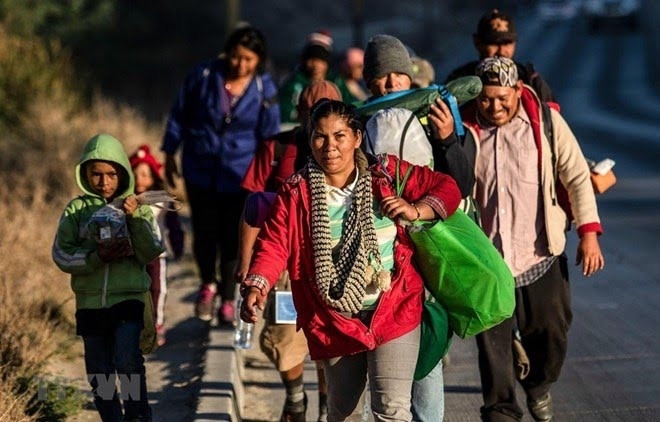According to the International Federation of Red Cross and Red Crescent Societies (IFRC), America is facing a huge challenge in protecting and meeting the humanitarian needs of migrants. The warning came in the context of consecutive migrant statistics recording new "records".
According to the International Organisation for Migration (IOM), in the first two months of 2022 alone, the number of people entering Central America from the Darien jungle, the natural border between Panama and Colombia, to find their way to North America has nearly tripled compared to the figure recorded in the same period in 2021. The number of migrants crossing the Darien forest last year was about 134,000, equivalent to the total number of migrants recorded in the entire previous decade.
In March, US border security forces arrested 210,000 people, the highest number in two decades. The Mexican side also announced that, since the beginning of 2022, it has blocked about 115,000 migrants from trying to enter the US, mainly from Central American countries.
The story of migrants is not a new issue in America. In recent years, the "Northern Triangle of Central America," consisting of Honduras, Guatemala and El Salvador, has served as the starting point and transit point for tens of thousands of people each year who seek to escape poverty and violence in their homeland.
Despite the dangers and risks of falling victim to human trafficking organisations, thousands of people are still trying to travel north to pursue their “American dream”, in the hope of finding work and a better life.
The head of the IOM mission in Panama said that the socio-economic crisis caused by the COVID-19 pandemic was one of the main factors that pushed thousands of people to leave their homeland.
The representative of the United Nations High Commissioner for Refugees (UNHCR) in Honduras emphasised that the massive influx of migrants reflects the urgent need to improve living conditions in countries, as well as to promote coordinated actions and support each other.
Countries in the region have been actively working to come up with a common response to the risk of the migration issue turning into an out-of-control crisis. Ministers from more than 20 countries in America met in Panama at the end of April to discuss the issue of migrants.
The countries agreed to establish a joint working group to tackle the rise in illegal migration at the continental level, with the central goal of stabilising living conditions for communities and addressing the root cause of the problem.
As the main destination for migrants, the US is working with Central American countries to limit the flow of migrants and return them to where they came from, as well as to strengthen measures to prevent gangs from bringing migrants illegally.
The administration of President Joe Biden is also preparing a comprehensive strategy to deal with the possibility of large numbers of migrants trying to enter the US after regulations to limit the COVID-19 epidemic expire on May 23.
The US has recently signed a cooperation agreement with Panama in the field of migration and hopes to sign the Los Angeles Declaration on Migration and Protection within the framework of the Summit of the Americas, scheduled to take place in June.
Forecasting that the migration flow in the region will not stop, the IOM continues to call on the Central American region and the international community to intensify efforts, especially to identify the root cause of the problem and find a reasonable solution.
The IOM also called on host countries to ensure access to asylum procedures, and provide more options for status of residence, and to step up the fight against human trafficking, discrimination and xenophobia.
















